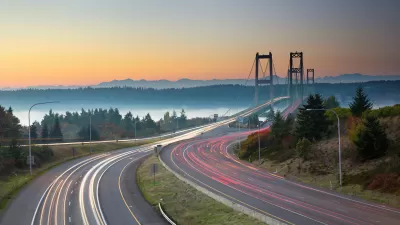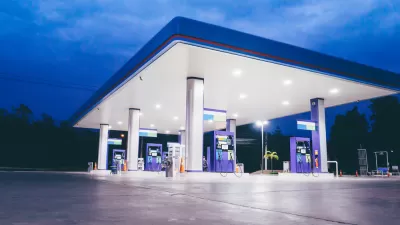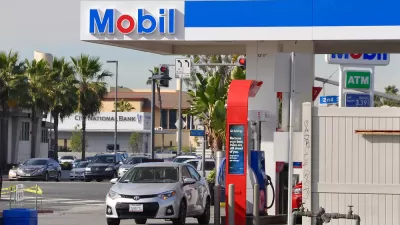While there may never be a good time to increase the federal gas tax, the same is not true when it comes to state gas taxes—perhaps because governors can't transfer billions of dollars from general funds to pay for roads. Lower gas prices helps.
What's happening on a state level could not be more different than what's happening inside the Beltway in terms of transportation funding. And it's not a partisan issue, as we've noted here on several occasions, beginning with Wyoming last year.
"Several states are tired of waiting for Congress to fix the federal highway trust fund, so they're considering raising gas taxes themselves to address their crumbling roads," writes NPR reporter David Schaper.
According to Carl Davis, a senior analyst with the nonprofit Institute on Taxation and Economic Policy (ITEP), "gas tax increases are now on the table in states across the country, from New Jersey to Utah to South Carolina to South Dakota," writes Schaper about states with Republican governors. "Democratic governors in Delaware, Vermont and Kentucky, and other states are also looking to possibly raise gas taxes, as has been done in Pennsylvania, Maryland, New Hampshire and Wyoming in the last two years."
"There have been overwhelming infrastructure needs for quite awhile and now that gas prices are lower, it's a little bit more politically feasible to talk about raising the gas tax," [Davis] says.
Schaper's focus is on the Republican governor of Michigan, Rick Snyder, who "is calling on lawmakers to roughly double Michigan's gas tax over time, to raise more than $1 billion." His goal: "get us to fair to good roads."
"There have been overwhelming infrastructure needs for quite awhile and now that gas prices are lower, it's a little bit more politically feasible to talk about raising the gas tax," he says.
We reported on Snyder's gas tax proposal last month which would replace the 19-cents excise tax with a "wholesale fuel sales tax, resulting in an anticipated $1.2 billion annual revenue increase."
Snyder is one of a growing number of Republicans across the country who see the need to spend big to improve infrastructure, and who are looking to increase gas taxes to pay for it.
Davis opines that with the plummeting price of gas, "(t)here's kind of been a switch that's been flipped." Sadly, no such switch exists in Congress or the White House.
ITEP's 2011 white paper, "'Building a Better Gas Tax,' offers three specific policy recommendations for modernizing -- and increasing -- state gasoline taxes," writes Driving Today's contributing editor, Tom Ripley.
- Increase gas tax rates to reverse their long-term declines; the “appropriate rate” of increase desired varies by state.
- Peg gas tax to grow alongside the cost of transportation construction projects.
- Create or enhance targeted tax credits for low-income families to offset the impact of gas tax increases.
However, #2 proved elusive on Nov. 4 in the Bay State, when voters rejected the gas tax indexing that the legislature had approved last year. Consequently, at least one Massachusetts rail project may be "on the chopping block."
[Hat tip to Bill Magavern of Coalition for Clean Air].
FULL STORY: GOP Leaders: Gas Tax Hike Could Fuel Fixes To Bad Roads And Bridges

Study: Maui’s Plan to Convert Vacation Rentals to Long-Term Housing Could Cause Nearly $1 Billion Economic Loss
The plan would reduce visitor accommodation by 25,% resulting in 1,900 jobs lost.

North Texas Transit Leaders Tout Benefits of TOD for Growing Region
At a summit focused on transit-oriented development, policymakers discussed how North Texas’ expanded light rail system can serve as a tool for economic growth.

Why Should We Subsidize Public Transportation?
Many public transit agencies face financial stress due to rising costs, declining fare revenue, and declining subsidies. Transit advocates must provide a strong business case for increasing public transit funding.

How to Make US Trains Faster
Changes to boarding platforms and a switch to electric trains could improve U.S. passenger rail service without the added cost of high-speed rail.

Columbia’s Revitalized ‘Loop’ Is a Hub for Local Entrepreneurs
A focus on small businesses is helping a commercial corridor in Columbia, Missouri thrive.

Invasive Insect Threatens Minnesota’s Ash Forests
The Emerald Ash Borer is a rapidly spreading invasive pest threatening Minnesota’s ash trees, and homeowners are encouraged to plant diverse replacement species, avoid moving ash firewood, and monitor for signs of infestation.
Urban Design for Planners 1: Software Tools
This six-course series explores essential urban design concepts using open source software and equips planners with the tools they need to participate fully in the urban design process.
Planning for Universal Design
Learn the tools for implementing Universal Design in planning regulations.
Ascent Environmental
Borough of Carlisle
Institute for Housing and Urban Development Studies (IHS)
City of Grandview
Harvard GSD Executive Education
Toledo-Lucas County Plan Commissions
Salt Lake City
NYU Wagner Graduate School of Public Service





























